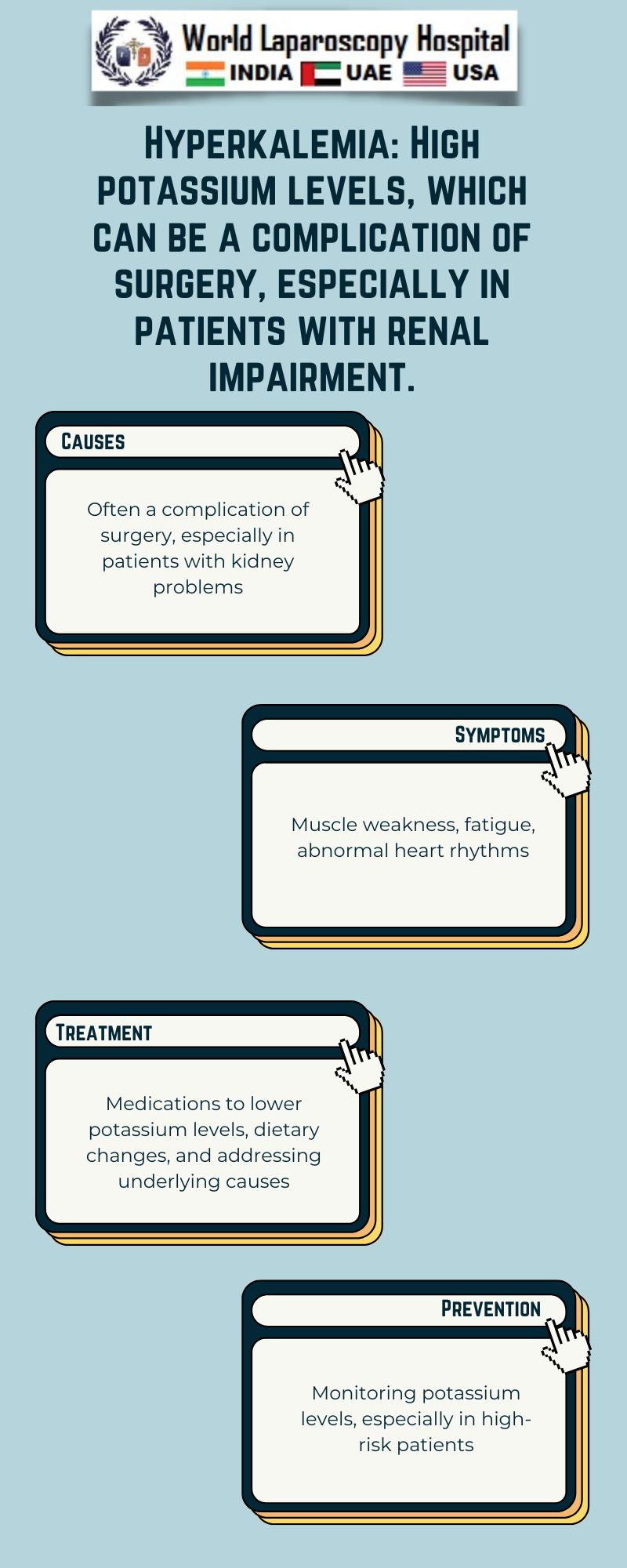Introduction
Hyperkalemia is a condition characterized by elevated levels of potassium in the blood, which can have serious health consequences if left untreated. While hyperkalemia can occur for a variety of reasons, it is especially concerning in patients undergoing surgery, particularly those with pre-existing renal impairment. This article will explore the causes, symptoms, and complications of hyperkalemia in surgical patients with renal impairment, as well as strategies for prevention and treatment.

Understanding Hyperkalemia
Potassium is an essential mineral that plays a crucial role in various bodily functions, including nerve and muscle function. However, excessive levels of potassium in the blood can disrupt the normal electrical activity of the heart, leading to potentially life-threatening complications such as cardiac arrhythmias and sudden cardiac arrest.
Hyperkalemia can occur when there is an imbalance between the intake and excretion of potassium. In patients with renal impairment, the kidneys may not be able to effectively excrete potassium, leading to its accumulation in the blood. Additionally, certain medications commonly used in surgical patients, such as potassium-sparing diuretics or angiotensin-converting enzyme (ACE) inhibitors, can further contribute to elevated potassium levels.
Risk Factors for Hyperkalemia in Surgical Patients
Several factors increase the risk of hyperkalemia in surgical patients, particularly those with pre-existing renal impairment. These include:
Chronic Kidney Disease (CKD):
Patients with CKD have reduced kidney function, making them more susceptible to hyperkalemia.
Acute Kidney Injury (AKI):
AKI can impair the kidneys' ability to excrete potassium, leading to its accumulation in the blood.
Medications:
Certain medications commonly used in surgical patients, such as potassium-sparing diuretics, ACE inhibitors, and nonsteroidal anti-inflammatory drugs (NSAIDs), can increase the risk of hyperkalemia.
Surgical Stress:
The stress of surgery can disrupt potassium balance in the body, leading to elevated levels.
Dietary Factors:
High potassium intake from foods or supplements can contribute to hyperkalemia, particularly in patients with impaired kidney function.
Symptoms and Complications of Hyperkalemia
The symptoms of hyperkalemia can vary depending on the severity of the condition. Mild cases may not cause any symptoms, while severe hyperkalemia can lead to muscle weakness, tingling sensations, and cardiac arrhythmias. In extreme cases, hyperkalemia can cause sudden cardiac arrest.
Complications of hyperkalemia can be life-threatening and include:
Cardiac Arrhythmias:
Elevated potassium levels can disrupt the normal electrical activity of the heart, leading to arrhythmias such as ventricular fibrillation or tachycardia.
Muscle Weakness:
High potassium levels can impair muscle function, leading to weakness or paralysis.
Kidney Damage:
Prolonged hyperkalemia can damage the kidneys, leading to further impairment of kidney function.
Cardiac Arrest:
In severe cases, hyperkalemia can cause the heart to stop beating, leading to cardiac arrest.
Prevention and Treatment of Hyperkalemia
Preventing hyperkalemia in surgical patients, especially those with renal impairment, is essential. This can be achieved through:
Monitoring Potassium Levels:
Regular monitoring of potassium levels in high-risk patients can help detect hyperkalemia early and prevent complications.
Adjusting Medications:
Healthcare providers should carefully consider the use of medications that can increase potassium levels in surgical patients with renal impairment.
Dietary Management:
Patients with renal impairment should be advised to limit their intake of potassium-rich foods and supplements.
Fluid Management:
Maintaining adequate hydration can help prevent hyperkalemia by promoting the excretion of potassium through the kidneys.
Treatment Options: Treatment of hyperkalemia typically involves lowering potassium levels in the blood through measures such as administering medications like calcium gluconate, insulin, or sodium bicarbonate to shift potassium into cells, or using diuretics to increase potassium excretion.
Conclusion
Hyperkalemia is a serious condition that can occur in surgical patients, particularly those with renal impairment. Understanding the risk factors, symptoms, and complications of hyperkalemia is essential for preventing and managing this condition effectively. By monitoring potassium levels, adjusting medications, and implementing dietary and fluid management strategies, healthcare providers can help reduce the risk of hyperkalemia and improve outcomes for surgical patients with renal impairment.